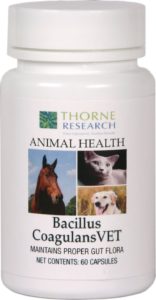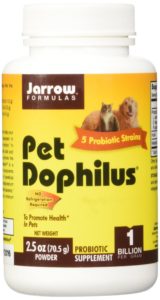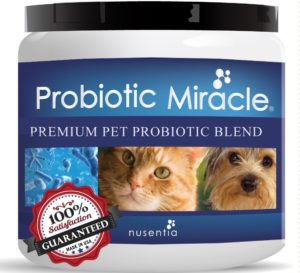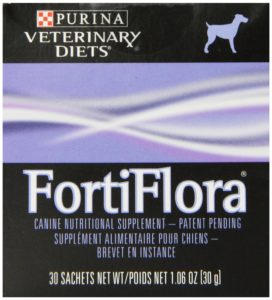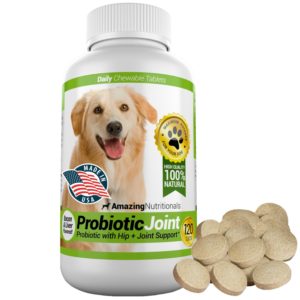Last Updated on June 9, 2024
We all want our furry friends to live their best lives, and that starts with good health. Just like humans, dogs can benefit from probiotics – those good bacteria that support digestion, immunity, and overall well-being. But with so many dog probiotics on the market, finding the right one can feel overwhelming. That’s why we’ve rounded up the top picks, based on quality, effectiveness, and expert recommendations.
Why Probiotics Matter for Your Dog
A healthy gut is the foundation of a healthy dog. Probiotics introduce beneficial bacteria into your dog’s digestive system, where they work to maintain a balanced gut microbiome. This balance is crucial for numerous bodily functions.
Here’s how probiotics can benefit your canine companion:
- Improved Digestion: Probiotics help break down food, easing common issues like diarrhea, constipation, and gas.
- Stronger Immunity: A healthy gut means a stronger immune system, better equipped to fight off infections.
- Increased Nutrient Absorption: Probiotics help dogs get the most out of their food, leading to better overall health.
Signs Your Dog Might Need a Probiotic Boost
While most dogs can benefit from probiotics, some may need them more than others. If your dog experiences any of the following, a probiotic supplement could be beneficial:
- Frequent diarrhea or loose stools
- Constipation
- Gas and bloating
- Skin allergies
- Weakened immune system (frequent infections)
Top Probiotic Picks for Your Canine Companion
We’ve researched and reviewed numerous dog probiotics to bring you this list of top contenders:
1. Thorne Research Veterinary – Bacillus Coagulans VET
Thorne Research is renowned for its commitment to quality and efficacy. This probiotic is specifically formulated to support dogs with digestive sensitivities.
- Top Features: Trusted brand, excellent for diarrhea and irritable bowel syndrome (IBS), free of GMOs, fillers, and harmful substances.
- Vet Recommended: Highly recommended by veterinarians for its quality and effectiveness.
2. Jarrow Formulas Pet Dophilus Powder
This popular probiotic powder is designed to promote a healthy balance of gut bacteria in dogs. It’s easy to mix into your dog’s food and offers comprehensive digestive support.
- Top Features: Improves digestion and overall immunity, contains inulin (a prebiotic fiber) for even better gut health, free of harmful Aspergillus.
3. Probiotic Miracle Dog Probiotics
This top-rated probiotic boasts a high concentration of beneficial bacteria and a palatable taste that dogs love. It’s a great all-around option for supporting gut health.
- Top Features: Amazon’s most popular choice, tasteless and easy to administer, packed with 1 billion CFUs of beneficial bacteria per scoop, fights yeast infections.
4. Purina Fortiflora Canine Nutritional Supplement
Backed by the trusted name of Purina, this probiotic supplement is a favorite among veterinarians. It’s known for its effectiveness in managing diarrhea and promoting digestive regularity.
- Top Features: Contains naturally occurring microorganisms found in dogs, effectively manages diarrhea, improves digestion and immunity, promotes firmer stools.
- Pro Tip: Mix with Greenies Pill Pockets for picky eaters!
5. Amazing Dogs Probiotics 100% Pure All-Natural
These tasty chews offer a dual-action approach to canine health, supporting both digestion and joint function. They’re an excellent choice for senior dogs or those with joint issues.
- Top Features: Tasty bacon-liver flavored chews, supports digestion and joint health with added glucosamine, MSM, and chondroitin, free of common allergens (yeast, wheat, egg).
6. VetriScience Laboratories Mega Dog Probiotic
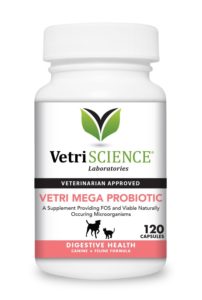
This high-potency probiotic features a diverse blend of eight probiotic strains to support optimal gut health. It’s a great option for dogs with food sensitivities or those recovering from digestive upset.
- Top Features: Amazon’s best-selling dog probiotic, non-dairy formula with 8 different probiotic strains, supports gastrointestinal function and normal bowel movements, ideal for dogs with food intolerances.
Ready to Give Your Dog’s Gut a Helping Hand?
Investing in a high-quality probiotic can make a world of difference in your dog’s health and happiness. Explore the options above and find the perfect probiotic to help your furry friend thrive! Remember, a healthy gut is a happy gut, and a happy gut means a happier, healthier dog.
Frequently Asked Questions About Dog Probiotics
What exactly are probiotics?
Probiotics are live microorganisms, primarily bacteria, that provide health benefits when consumed. They are often called “good” or “helpful” bacteria because they help balance the gut microbiome, which is essential for digestion, immunity, and overall well-being.
How do probiotics work in dogs?
Canine probiotics, like those for humans, contain live bacteria that must survive the harsh environment of the stomach to reach the intestines. Once there, they can multiply and work their magic. These beneficial bacteria help break down food, produce essential nutrients, and support the immune system.
Why should I give my dog probiotics?
Probiotics offer a range of benefits for dogs, including:
- Improved Digestion: They aid in breaking down food, reducing gas, diarrhea, and constipation.
- Enhanced Immunity: A healthy gut contributes to a robust immune system, helping your dog fight off infections.
- Increased Nutrient Absorption: Probiotics maximize the nutritional value your dog receives from their food.
- Potential Relief from Allergies: Some studies suggest probiotics may help manage skin allergies in dogs.
How do I know if my dog needs probiotics?
While most dogs can benefit from probiotics, some signs might indicate a greater need:
- Frequent diarrhea or loose stools
- Constipation
- Gas and bloating
- Skin allergies
- Weakened immune system (frequent infections)
Can probiotics be given to dogs with certain health conditions?
Probiotics are generally safe for dogs, but it’s crucial to consult your veterinarian, especially if your dog has underlying health conditions. Some conditions, like a compromised immune system, might require a different approach.
Are there any side effects of giving probiotics to dogs?
Probiotics are generally safe, but some dogs might experience mild side effects like gas, bloating, or diarrhea, especially when first starting. If you notice any adverse reactions, discontinue use and consult your vet.
Can probiotics be given to dogs of all ages and breeds?
Yes, probiotics are generally safe for dogs of all ages and breeds. However, it’s always best to consult your veterinarian to determine the appropriate dosage and type of probiotic for your dog’s specific needs.
Should probiotics be given to dogs daily, or only as needed?
The frequency of probiotic administration depends on your dog’s individual needs. Some dogs benefit from daily supplementation, while others might only need it occasionally. Your veterinarian can provide guidance on the best approach for your furry friend.
Will probiotics interact with other medications my dog is taking?
Probiotics might interact with certain medications, such as antibiotics. Always inform your veterinarian about any medications or supplements your dog is taking before starting them on probiotics.
Are there any foods that naturally contain probiotics for dogs?
Yes, some dog foods are specifically formulated with probiotics. Additionally, you can offer small amounts of probiotic-rich fermented foods like yogurt (plain, unsweetened), kefir, and sauerkraut. However, always introduce new foods gradually and in moderation.
Can I give my dog both probiotics and prebiotics?
Absolutely! Probiotics and prebiotics work synergistically to promote gut health. Prebiotics are non-digestible fibers that act as food for probiotics, fostering the growth of beneficial bacteria in the gut. Some probiotic supplements even contain prebiotics for added benefit.
How long does it take for probiotics to work in a dog’s gut?
The time it takes for probiotics to take effect varies depending on the individual dog, the probiotic strain used, and the reason for supplementation. Some dogs show improvement within a few days, while others might take a few weeks. Remember, probiotics are a supplement, not a cure, and work best as part of a holistic approach to your dog’s health.
Types Of Dog Probiotics
Not all Probiotics are effective in dogs. The known strains that can help dogs include:
- Enterococcus Faecium (Strain SF68): Helps to aid digestion and maintain a good range of bacteria in the dog’s digestive system.
- Bifidobacterium Animalis(Strain AHC7): Helps to protect the digestive system of the dog.
- Lactobacilus Rhamnosus (Strain GG): Helps to prevent diarrhea in dogs.
- Bacillus Coagulans: This bacteria also help to prevent diarrhea in dogs. In addition, it also helps to improve the overall dog’s digestive tract.
- Lactobacillus Acidophilus: It improves the digestive system, and also prevents yeast infections and diahhrea. It is sometimes used to relieve pain caused by arthritis.
- Bifidobacterium Lactis: A bacteria that improve the dog’s overall immunity system
- Bifidobacterium Longum: Also helps to improve the dog’s immune system, and keep the digestive system functioning.
- Bifidobacerium Bifidum: Promotes a good mix of flora in the dog’s digestive tract.
- Lactobacillus Casei: Helps to grow other good bacteria.
- Lactobacillus Plantarum: This is important, as it helps to ensure that the nutrients in vitamins and supplements are absorbed by the dog.
If you would like to find out more, you can actually refer to this post. We gathered most of our information from there.
 Dog N Treats All dogs deserve to be pampered
Dog N Treats All dogs deserve to be pampered
